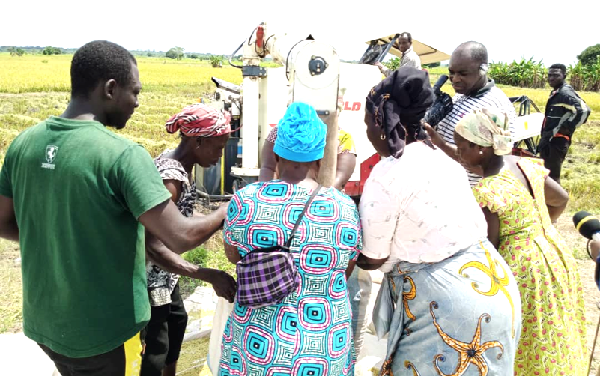
Increasing food sufficiency: GASIP supports smallholder farmers
Agriculture has enormous potential for the country; however, its modernisation requires programmes that will provide support to smallholder farmers in rural communities who are responsible for the food security needs of our country, Ghana.
The efficient function of production and its value chain activities through vibrant projects and programmes by the agricultural sector is very relevant in these current economic challenges.
Advertisement
Response to the call
It was in response to these needs that the International Fund for Agriculture Development (IFAD), the government, through the Ministry for Food and Agriculture (MoFA) implemented the Ghana Agriculture Sector Investment Programme (GASIP) aimed at promoting inclusive agriculture value chain activities in the rural areas.
The GASIP aims at a sustainable poverty reduction in the rural areas and to ensure that agribusiness and smallholders increase profitability and resilience to climate change.
Through the effort of the Minister of Food and Agriculture, Dr Owusu Afriyie Akoto, and the National Programme Coordinator, Klutse Kudomor, and his team, a review of the programme beneficiary selection was done to leverage the MoFA projects –Youth in Agriculture Programme (YIAP).
Gender inclusion & empowerment training in nutrition & food processing, food safety and quality to increase their market access and training in Gender Action Learning System (GALS) methodology have been key in the implementation of the programme.
The approach of GASIP is to mobilise smallholder farmers through farmer-based organisations (FBOs), which are linked to production and its value chain activities. This made it easy for an efficient and effective input distribution, delivery of mechanisation services and training of farmers in modern agronomic practices.
GASIP, over the period, has supported over 91,000 acres of cultivated land, covering about 47,000 smallholder farmers working with 600 FBO and 53 value chain drivers (VCDs) in our rural communities.
Disbursement of funds
A total of $26.7 million out of $32.0 million was disbursed, representing an 84 per cent increase from $3.8 m in 2019 to date.
The adaptation for smallholder agriculture programme grants of $6.34m out of $8.9 million has been disbursed towards climate mainstreaming efforts resulting in disbursement of $2.4 million in 2019 to date across the country.
Additionally, an amount of $1.85 million has also been disbursed to the Ministry of Gender, Children and Social Protection and the WFP, to the extremely vulnerable farmers including people living with disability from the nine poorest districts of the country.
Climate Change
This is an integral part of the GASIP operations. The programme has implemented conservation agriculture alongside other climate smart agriculture practices in more than 66 communities in 12 districts.
Infrastructure component
The objective of the infrastructure component is to facilitate the development of agriculture value chains by integrating rural and public infrastructure.
GASIP, over the period, is working with over 55 VCDs for smallholder farmers to accesses improved seed, fertilisers and mechanisation (thresher harvesters) services to improve production and increase yields and incomes.
The organisation has also supported the construction of farm roads, provided irrigation facilities and many more.
Thousands of small-scale farmers in the country are beneficiaries of the GASIP interventions. A visit to Weta, a community in Ketu North of the Volta Region revealed significant gains under the programme.
The writer is the Head of Public Relations, MoFA




